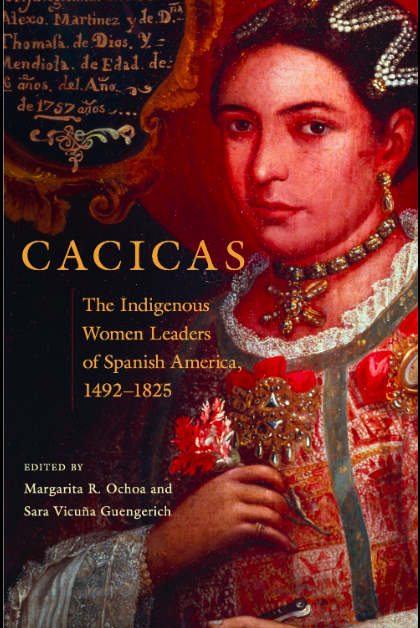
Cacicas: The Indigenous Women Leaders of Spanish America, 1492-1825 (University of Oklahoma Press) will be out on March 11, but it is already available for pre-order. Enter the code 18CACICAS at checkout on the oupress.com website to receive 20% off. This coupon will be active from 2/8/2021 to 4/1/2021, and it also guarantees free shipping on orders over $75.
About the book:
The term cacica was a Spanish linguistic invention, a female counterpart to caciques, the Arawak word for male indigenous leaders in Spanish America. But the term’s meaning was adapted and manipulated by natives, creating a new social stratum where it previously may not have existed. This book explores that transformation, a conscious construction and reshaping of identity from within.
Cacicas feature far and wide in the history of Spanish America, as female governors and tribute collectors and as relatives of ruling caciques—or their destitute widows. They played a crucial role in the establishment and success of Spanish rule, but were also instrumental in colonial natives’ resistance and self-definition.
In this volume, noted scholars uncover the history of colonial cacicas, moving beyond anecdotes of individuals in Spanish America. Their work focuses on the evolution of indigenous leadership, particularly the lineage and succession of these positions in different regions, through the lens of native women’s political activism. Such activism might mean the intervention of cacicas in the economic, familial, and religious realms or their participation in official and unofficial matters of governance. The authors explore the role of such personal authority and political influence across a broad geographic, chronological, and thematic range—in patterns of succession, the settling of frontier regions, interethnic relations and the importance of purity of blood, gender and family dynamics, legal and marital strategies for defending communities, and the continuation of indigenous governance.
This volume showcases colonial cacicas as historical subjects who constructed their consciousness around their place, whether symbolic or geographic, and articulated their own unique identities. It expands our understanding of the significant influence these women exerted—within but also well beyond the native communities of Spanish America.
Contents
Prologue: Cacicas in the Early Spanish Caribbean
Ida Altman
Introduction
Sara Vicuña Guengerich and Margarita R. Ochoa
Part I. North and Central America
Chapter 1:The Cacicas of Teotihuacan: Early Colonial
Female Power and Wealth
Bradley Benton
Chapter 2:Founding Mothers: The Tapias of Querétaro,
1571–1663 63
Peter B. Villella
Chapter 3:Doña Marcela and the Cacicas of Bourbon Mexico
City: Family, Community, and Indigenous Rule
Margarita R. Ochoa
Chapter 4:Sinking Fortunes: Two Female Caciques and
an Ex-gobernadora in the Kingdom of Guatemala, 1700–1821
Catherine Komisaruk
Part II. South America
Chapter 5:“Women were governing before the Spaniards
entered in this kingdom”: The Institutionalization
of the Cacica from the North Coast of Peru
Karen B. Graubart
Chapter 6:Public Voice and Political Authority:
Native Female Leadership in the Sixteenth-Century Northern Andes
Chantal Caillavet
Chapter 7:Cacicas, Land, and Litigation in
Seventeenth-Century Chincha, Peru
Liliana Pérez Miguel and Renzo Honores
Chapter 8:A Royalist Cacica: Doña Teresa Choquehuanca
and the Postrebellion Natives of the
Peruvian Highlands
Sara Vicuña Guengerich
Chapter 9:Peacemaker Cacicas in the Río de la Plata
Southern Frontier
Florencia Roulet
Conclusion:To Be Cacica in Colonial
Times—The Rhetoric of “Pureza”
Mónica Díaz
Appendix:Cacicas in Nicaragua, 1522–1550
Patrick S. Werner

